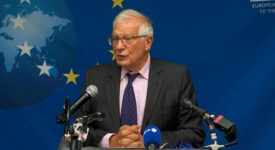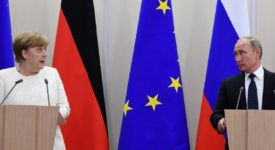An unassuming conference on “Peace in the Middle East”, held in Poland in mid February, epitomised the split between the EU and the United States over how to address the challenges emanating from Iran. The differences in attendance were glaring: Washington sent its Vice-President and Secretary of State, Israel its Prime Minister, yet most EU member states opted not even to dispatch their foreign ministers, while Federica Mogherini, the EU’s foreign policy chief, said she could not travel altogether due to scheduling conflicts. Given that Israeli leader Benjamin Netanyahu bluntly spoke of an Arab-Israeli gathering “to advance the common interest of war with Iran”, the Europeans may feel vindicated in their decision.
Truth be told, the EU and the US have not seen eye-to-eye on Iran for most of the Islamic Republic’s now 40-year history. Traumatised by the 1979-81 hostage crisis, Washington has consistently opted for a more hard-line approach, using sanctions and threatening military action to bring Tehran to its knees. Today, more than ever, Washington aims at regime change as a matter of principle. The Europeans, in contrast, with variations between countries like Britain and France taking a tougher line than, say, Germany and Italy, have refused to demonise Iran. They too see the country as a challenge, both regionally and to their own security interests, but they want to address these without per se delegitimizing the country or its threat perception.
The Europeans’ latest effort to enable at least a minimum of trade relations with Iran under the obscure name of INSTEX (Instrument in Support of Trade Exchanges) has been the target of particular American disparagement. US Vice-President Mike Pence sharply criticised the instrument at the onset of the Warsaw conference as “an ill-advised step that will only strengthen Iran, weaken the EU and create still more distance between Europe and the United States.” But the problem is that it was Washington’s U-turn on the Iran deal that created this distance in the first place. This is one of the reasons why the Europeans do not feel compelled to fully side with their American ally – in addition to the fact that the US administration does not have a plan to deal with the wider challenges Iran poses.
In fact, some believe that demonstrating this cleavage was part of Washington’s intention when it had Secretary Mike Pompeo announce the gathering during his hastily conceived trip to the region in January. Not only did he surprise even the authorities in Warsaw, but the choice of venue was a deliberate attempt to break ranks among EU member states: Poland is a country whose populist right-leaning government is in conflict with Brussels and fellow members over rule of law issues and craves for US protection against Russia, so it is ready to toe Washington’s line on Iran, if needed.
Holding a conference on the Middle East without Iran, Turkey, or Russia (who actually held a summit on Syria on the very same day), and with only limited participation from Europe was never a good start, even without the war rhetoric. The difficulty for the Europeans is to counter this confrontational approach with a strategy of their own, for which they need unity of purpose and the respective means to implement it. Both are hard to muster if at the same time the transatlantic alliance is put into question by Washington. The EU is right to take a more comprehensive approach to the region, resisting the singling out of Iran as its main source of evil. Yet, it has to carefully craft its own approach without endangering the security alliance it fundamentally depends on.
‚Will Transatlantic Relations Break Down Over Iran?‘ – Opinion by Cornelius Adebahr – Carnegie Europe.







